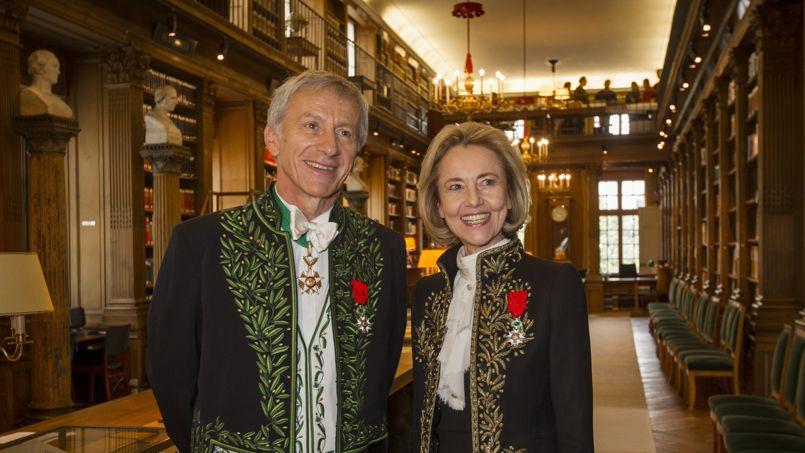The French Academy under the spell of Dominique Bona<
“Madame, what a pleasure to pronounce this word to welcome a new member under this Dome! And since this happiness is still too rare, I will pronounce it again: “Madam”!” It is with these words that Jean-Christophe Rufin received Dominique Bona this afternoon, Quai de Conti.
Among the audience, many well-known heads from the world of publishing: Olivier Nora, Dominique Bona's editor, Antoine and Isabelle Gallimard, Eric Neuhoff, Diane de Margerie, Jean-Noël Pancrazi, the omnipresent Gonzague Saint- Bris, and even Baron Seillière…
The novelist and biographer, elected in April 2013 to chair 33, is the eighth woman in history sitting among the Immortals. An armchair previously occupied by Voltaire, Jean-Louis Vaudoyer and Marcel Brion, among others. Dominique Bona succeeds novelist and publisher Michel Mohrt, who died in 2011 at the age of 97.
She wore the green coat, designed by Karl Lagerfeld in the form of a sober frock coat enhanced with braided embroidery by Lesage, and the traditional sword (not compulsory for academicians), made by two young jewelers from Biarritz, of Catalan origin , like her. This "service weapon" had been officially given to him last Monday, at the Cercle de l'Union interalliée.
Born in 1953 in Perpignan, daughter of the writer and TV man, Arthur Conte, Dominique Bona began her literary career with the novel, when she was a literary critic for Quotidien de Paris. In 1987, she published her first biography, devoted to Romain Gary, and crowned by the French Academy. Subsequently, she focused on the lives of women with singular destinies: Gala, the muse of Eluard then of Dali, Berthe Morisot, Camille Claudel, the Rouart sisters, and most recently, Jeanne Loviton, the last love of Paul Valéry (I'm crazy about you). In the meantime, she has published several novels, including Le manuscript de Port-Ébène (Renaudot Prize in 1998) and two biographies (on Stefan Zweig and on the academician André Maurois), while lending her pen to Le Figaro littéraire.

Jean-Christophe Rufin, in a teasing tone imbued with sympathy, immediately hailed the work of Dominique Bona, "dedicated to women, their talent, their struggles, their creations", before adding: "The women in this Company are not a group, a number, a quota. They are singular personalities, each unique and precious, and their contribution is not measured by their numerical importance. How many of us, for example, have passionately loved Jacqueline de Romilly?
In his portrait, after evoking his childhood and his studious youth, he returned to the writers and artists she loved and commented on, praising his “exceptional capacity for empathy”. Changing his tone, he let go, smiling: "We would look in vain in your work for a biography of Madame de Gaulle"... The public burst out laughing. This warm welcome ended with the evocation of Voltaire, “under this Cupola with the lights of undergrowth, in the middle of these moss-colored clothes, in these walls inhabited by so many ghosts”. The final word was: “We welcome you today with happiness, Madame. Welcome among us”. The assistance was under the spell of the verb.
Eagerly awaited, finally greeted by bursts of applause, Dominique Bona's speech is among the most relevant and brilliant of recent years. As we know, the exercise is difficult, even perilous: to praise his predecessor, regardless of the esteem we have for him. We remember Paul Valéry in 1927, refusing to pronounce the name of Anatole France, mentioning, in a beautiful oratorical pirouette, “France, whose name he took”… Dominique Bona, who loved and admired Michel Mohrt, “ a man who above all lived in his dreams”, recalled under the Dome this tour de force of the disciple of Mallarmé.
For an hour, she not only praised the man and his work, but painted a magnificent literary portrait: "Everything he loves and makes him dream, the very source of his books, remains linked for him to the sound of the waves , to the cries of the gulls, to the unstable shapes of the clouds and the softness of the springs.” Regarding the man and his temperament, this academician who liked to proclaim loud and clear that he did not like dictionaries, here is what she appreciated about him: "He always lived and wrote, with an upright heart." His speech ended with these just words: “You never enter the French Academy alone. We enter it with the dear shadows of those who are no more. We also enter it with the admiration we have for those who are themselves the depositaries of a part of the spirit of the great figures who preceded them”.
Are expected soon under the Cupola: Dany Laferrière, Alain Finkielkraut and Marc Lambron.
Find the entirety of the two speeches on the website of the French Academy:
www.academie-francaise.fr/actualites/reception-de-mme-dominique-bona-f33.


 Tags:
Tags: Prev
Prev







